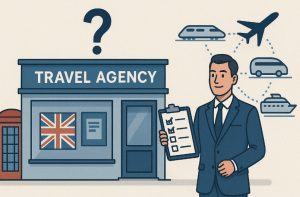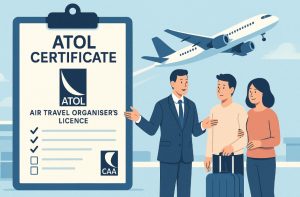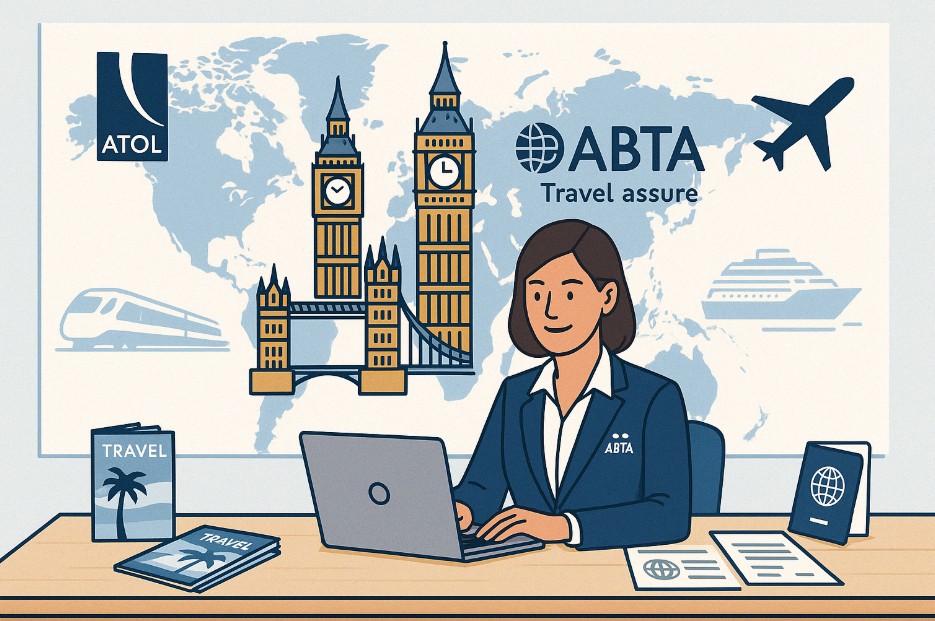Table of Contents
ToggleStarting a travel agency in the UK can be an exciting and lucrative venture. Whether you’re passionate about helping others discover the world or looking to enter a thriving industry, understanding the legal requirements, licensing, and compliance processes is essential. One of the most frequently asked questions by new agents is: Do you need a travel agent licence to operate legally in the UK?
This comprehensive guide explores the legal framework, industry certifications like ATOL and ABTA, and other crucial elements such as bonding, consumer protection, and rail travel licensing that are relevant for setting up a travel business in the UK.
Do You Need a Travel Agent Licence to Operate in the UK?

In the UK, a dedicated travel agent licence is not legally required to work as a travel agent in a general sense. However, various licensing schemes and bonding mechanisms are required or recommended depending on the type of services you plan to offer.
For example, if you intend to sell air travel packages, you must obtain an ATOL (Air Travel Organiser’s Licence) from the Civil Aviation Authority (CAA). If you’re offering non-flight-based package holidays, such as cruises or rail journeys, ABTA bonding is recommended.
While these are not always legally mandatory, they play a critical role in protecting consumers and ensuring your business operates with integrity and professionalism.
In essence, even if licensing isn’t a blanket requirement, being certified shows that your business is committed to high standards and legal compliance.
What Are the UK Travel Agency Regulations You Must Follow?
The UK’s travel sector is governed by several regulations that aim to safeguard consumer interests and maintain the integrity of the market. Anyone looking to operate a travel agency must understand and comply with these laws:
- The Consumer Protection from Unfair Trading Regulations 2008 prohibit misleading advertising and unfair business practices.
- The Package Travel and Linked Travel Arrangements Regulations 2018 ensures that customers are protected if a package holiday is cancelled, disrupted, or if the travel provider ceases trading.
- Businesses handling flight-inclusive packages must comply with ATOL regulations under the supervision of the CAA.
- If your business collects or processes personal data, you must comply with the UK GDPR and register with the Information Commissioner’s Office (ICO).
These frameworks collectively ensure that travel agents operate transparently, provide financial protection to customers, and adhere to fair business practices.
How Do ATOL and ABTA Differ and Why Are They Important?
While the terms ATOL and ABTA are sometimes used interchangeably, they serve different functions within the travel industry. Understanding the distinction is key to determining which applies to your business.
1. ATOL (Air Travel Organiser’s Licence)

ATOL is a legal requirement for UK travel agents selling flight-inclusive holidays. It protects consumers if the travel company fails, ensuring they are either refunded or brought home safely. The licence is issued by the Civil Aviation Authority (CAA) and applies to both flight-only bookings and flight-inclusive packages.
There are several types of ATOL licences based on business size and service offerings:
- Standard ATOL: For businesses handling over 500 passengers annually.
- Small Business ATOL: Suitable for agencies selling fewer than 500 flight-based packages per year, costing £1,223 annually.
- ATOL to ATOL trade sales: Required if you plan to sell travel services to other ATOL holders.
- Franchised ATOL: For members of approved travel organisations selling fewer than 1,000 trips annually.
It’s important to note that flights booked directly through airlines do not carry ATOL protection, so agents selling such packages must ensure they comply with alternative bonding measures if applicable.
2. ABTA (Association of British Travel Agents)

ABTA is not a legal requirement but is considered an industry standard. It provides financial protection for non-flight-based holidays such as cruises, rail, or coach travel. In addition, ABTA offers:
- Legal support and crisis management.
- Industry updates and operational guidance.
- A trusted brand name that customers recognise and rely upon.
To join ABTA, applicants must pay a £750 application fee (plus VAT) and a £1,250 joining fee, along with submitting financial information and business credentials. The value it provides in terms of support and customer assurance often outweighs the initial cost, especially for new agencies.
What Legal Requirements Must You Meet to Set Up a Travel Agency in the UK?

Starting a travel agency legally involves more than just obtaining a licence. Several steps must be taken to ensure your operations are legitimate and trustworthy.
- Register Your Business
- If you plan to operate as a limited company, you must register with Companies House.
- Sole traders and partnerships should inform HMRC and ensure tax obligations are met.
- Apply for Relevant Licences
- ATOL is mandatory for selling air-inclusive packages.
- ABTA is advisable for customer protection and brand credibility.
- For rail travel sales, apply for a Travel Agent Licence via the Rail Delivery Group (RDG).
- Secure Appropriate Insurance
- Public liability insurance.
- Professional indemnity insurance.
- Business interruption or cyber insurance, depending on your model.
- Meet Bonding and Financial Protection Requirements
- Establish a trust account or obtain a bonding agreement to safeguard client money.
- These mechanisms are essential under the Package Travel Regulations.
- Data Protection Compliance
- Register with the ICO and ensure compliance with UK GDPR laws.
- Implement data handling policies and secure booking systems.
How Do You Apply for a Travel Agent Licence and ATOL in the UK?
To obtain an ATOL licence, you must submit an application to the Civil Aviation Authority, including detailed financial documents such as balance sheets, forecasts, and bank references. Once submitted, the CAA assesses the financial strength of your business and may request additional guarantees or bonds.
The process generally takes 8 to 12 weeks, and fees vary depending on your licence type. In addition to your annual licence fee, you must also pay the ATOL Protection Contribution (APC) of £2.50 per passenger.
ATOL also expects you to keep robust customer records, booking information, and sales data to ensure full traceability in the event of a claim.
What Bonding and Financial Protections Are Required for Travel Agents?

Consumer protection is at the core of UK travel legislation. Bonding ensures that in the event your agency collapses, customers will not be financially disadvantaged or stranded abroad.
There are several options to fulfil your bonding obligations:
- ABTA bonding for non-flight-based travel.
- Trust accounts, where customer funds are held until after travel services are delivered.
- Travel Trust Association (TTA) membership, offering a more flexible alternative with built-in bonding and operational support.
These measures not only meet legal requirements but also build consumer confidence and reduce the risk of disputes.
Which Business Model Should You Choose for Your UK Travel Agency?
The type of business model you choose—home-based, online, or a traditional high-street agency—will influence how you approach compliance, marketing, and customer service.
- A home-based model is cost-effective and offers flexibility, but still requires full compliance with licensing and data protection laws.
- Online travel agencies must ensure robust digital systems for booking and customer data, alongside transparent refund and complaint processes.
- High-street agencies may incur more overheads but benefit from foot traffic and a strong local presence, often appealing to less digitally confident consumers.
Each model requires the same legal foundation: business registration, consumer protection compliance, and appropriate bonding.
What Common Legal Mistakes Should New UK Travel Agents Avoid?
New agents often stumble when they underestimate the complexity of compliance. Common mistakes include:
- Selling air packages without an ATOL licence.
- Not registering with HMRC or Companies House.
- Ignoring GDPR obligations or data handling rules.
- Operating without public liability or professional indemnity insurance.
- Confusing ABTA with ATOL, or assuming one replaces the other.
Addressing these issues early can prevent costly setbacks and legal complications.
How Can You Legally Start a Travel Agency in the UK with Confidence?

To build a legally sound and customer-focused travel business in the UK, follow these foundational steps:
- Register your business structure with the appropriate government authority.
- Apply for relevant licences and memberships such as ATOL, ABTA, or TTA.
- Set up financial protections through bonding or trust accounts.
- Secure business insurance tailored to the travel industry.
- Ensure your data handling processes comply with GDPR.
- Invest in professional development and stay updated with industry news.
For those seeking extra guidance, travel franchise opportunities like The Travel Franchise offer ready-made systems, expert mentorship, and access to booking platforms that meet industry standards. This route can fast-track your success and help you start selling protected holidays from day one.
Additional Licensing: Travel Agent Licence for UK Rail Sales
If you plan to sell train tickets, a specific Travel Agent Licence issued by the Rail Delivery Group (RDG) is required. This licence allows you to sell a wide range of National Rail products, access train reservation systems, and earn commissions on sales.
Key Details:
- Application fee: £300 plus VAT
- Minimum sales target: £25,000 annually
- Bonding: Minimum £10,000 financial cover
- Commission: Typically 3%, with settlement every four weeks
Agents must also ensure that a minimum of two staff members (or 20% of their team) hold a Certificate of Rail Agent Competency (CORAC), verifying their knowledge of rail travel systems and conditions.
The licence includes access to Ticket Issuing Systems (TIS) and allows fulfilment via e-tickets, m-tickets, or Tickets on Departure (ToD). It also includes mechanisms for handling refunds and accounting via Direct Debit.
Frequently Asked Questions
What licences do I need to sell travel packages in the UK?
An ATOL licence is mandatory for selling flight-inclusive holidays. For non-flight holidays, ABTA or TTA bonding is advised.
Is ATOL required for every travel agent?
No. It’s only required if you sell air-based travel packages. Non-flight travel agents can operate with ABTA or similar bonding.
Can I run a travel agency from home in the UK?
Yes, many travel agents operate successfully from home. However, you must still comply with all licensing, bonding, insurance, and data protection laws.
What’s the cost of an ATOL licence?
The Small Business ATOL costs £1,223 annually. Additional charges include bonding fees and a £2.50 per passenger protection contribution.
Do I need licensing to sell rail travel?
Yes. Selling National Rail tickets requires a specific licence from RDG, which includes staff qualifications, bonding, and system access.
Are ABTA and ATOL the same thing?
No. ATOL is a government scheme protecting air travel. ABTA is a trade association offering bonding for non-flight travel and legal support.
Can I become a travel agent without experience?
Yes. Through travel franchises, you can access training, booking platforms, and ATOL/ABTA coverage, enabling you to launch quickly and professionally.




